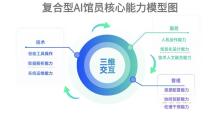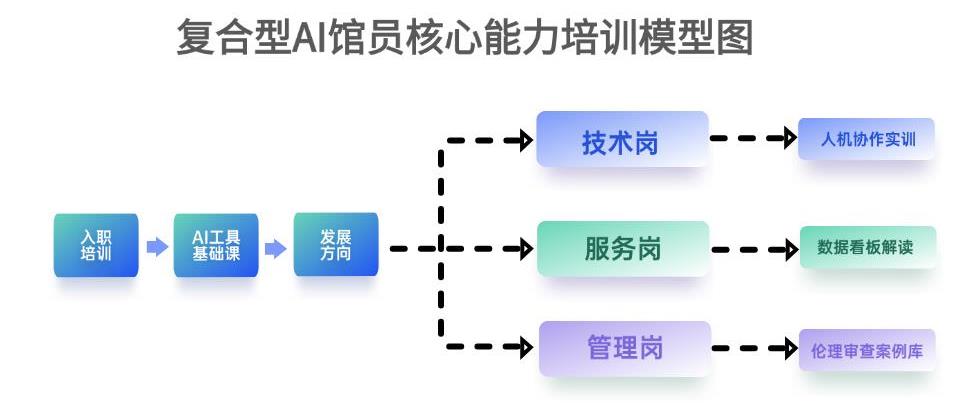| [1] |
魏丽丽. AI赋能图书馆服务焕新[J]. 文化产业, 2025(14): 10-12.
|
|
WEI L L. AI empowers library services to renew[J]. Culture industry, 2025(14): 10-12.
|
| [2] |
中国高校校办产业协会. 高等院校智慧型图书馆建设要求 [S]. 北京: 中国高校校办产业协会, 2024.
|
| [3] |
王松云, 梅昊. AI时代高校图书馆员职业发展探析[J]. 宿州学院学报, 2024, 39(11): 80-84.
|
|
WANG S Y, MEI H. Study on the career development of university librarian in AI era[J]. Journal of Suzhou University, 2024, 39(11): 80-84.
|
| [4] |
汤浩家. 生成式AI回答事实型参考咨询问题的效果与启示[J]. 图书馆研究与工作, 2025(5): 24-31.
|
|
TANG H J. The effectiveness and implications of generative AI in answering fact-based questions in reference services[J]. Library science research & work, 2025(5): 24-31.
|
| [5] |
洪辉, 林俊伟, 肖铮, 等. DeepSeek驱动的高校图书馆AI应用发展现状、挑战及前景: 与云瀚联盟专家的对话与思考[J]. 信息与管理研究, 2025, 10(3): 32-40.
|
|
HONG H, LIN J W, XIAO Z, et al. Current status, challenges, and prospects of DeepSeek-driven AI applications in university libraries: Expert dialogues and analysis from the Yunhan community[J]. Journal of information and management, 2025, 10(3): 32-40.
|
| [6] |
许磊. 大模型时代图书馆员的AI应用开发: ESSE方法论与实践探索[J]. 信息与管理研究, 2025, 10(1): 20-33.
|
|
XU L. AI application development for librarians in the era of large language models: ESSE methodology and practical exploration[J]. Journal of information and management, 2025, 10(1): 20-33.
|
| [7] |
钟坚安. 图书馆员AI素养的构成研究[J]. 图书馆界, 2025(1): 46-51, 82.
|
|
ZHONG J A. Study on the composition of librarians' AI literacy[J]. Library world, 2025(1): 46-51, 82.
|
| [8] |
张静蓓, 徐亚苹, 周琼, 蔡迎春. 未来学习中心建设:图书馆的角色定位、功能重塑及实践探索[J]. 农业图书情报学报, 2023, 35(6): 43-50.
|
|
ZHANG J B, XU Y P, ZHOU Qi, et al. Future learning centers: A study on libraries' role reorientation, function reconstruction, and practical innovations[J]. Journal of library and information science in agriculture, 2023, 35(6): 43-50.
|
| [9] |
University of Edinburgh. Using generative AI tools in academic work[EB/OL]. [2025-01-03].
|
| [10] |
Macquarie University. Using AI-powered tools for literature reviews[EB/OL]. [2025-01-03].
|
| [11] |
The University of British Columbia. Using AI in library research and learning[EB/OL]. [2024-10-20].
|
| [12] |
李卫姣, 虞晨琳, 蔡迎春. 高校图书馆AI素养教育的多维实践路径探析: 以上海外国语大学图书馆为例[J]. 图书馆杂志, 2025, 44(8): 20-29.
|
|
LI W J, YU C L, CAI Y C. Exploring multidimensional practice path of AI literacy education in university libraries: A case study of Shanghai international studies university library[J]. Library journal, 2025, 44(8): 20-29.
|
| [13] |
刘琼, 刘星, 刘桂锋. “人工智能+高等教育”应用场景下的AI素养框架研究[J]. 农业图书情报学报, 2024, 36(8): 43-55.
|
|
LIU Q, LIU X, LIU G F. Framework of AI literacy for multi-role capabilities in future education: Based on typical cases of "AI + Higher Education" application scenarios[J]. Journal of library and information science in agriculture, 2024, 36(8): 43-55.
|
| [14] |
胡伟群, 徐曦, 石钰莹, 等. 生成式AI时代图书馆员AI素养的培养路径探索[J]. 图书馆界, 2025(2): 38-43.
|
|
HU W Q, XU X, SHI Y Y, et al. Exploring the path of cultivating librarian literacy in the era of generative artificial intelligence[J]. Library world, 2025(2): 38-43.
|
| [15] |
孙丽娟. 新质生产力视域下公共图书馆员向提示词馆员转型探索[J]. 农业图书情报学报, 2025, 37(1): 17-32.
|
|
SUN L J. Exploring the transition of public librarians to “prompt librarians” from the perspective of new quality productive forces[J]. Journal of library and information science in agriculture, 2025, 37(1): 17-32.
|
| [16] |
李浩, 左静远. AI时代公共图书馆员角色重塑与胜任力思考[J]. 图书馆界, 2024(6): 54-59.
|
|
LI H, ZUO J Y. Reshaping the role and competence thinking of public librarians in the AI era[J]. Library world, 2024(6): 54-59.
|
| [17] |
张文迪, 陈燕方. 生成式AI助力图书馆员数字素养提升[C]//2024年第十七届图书馆管理与服务创新论坛论文集. 泉州: 中国人民大学图书馆, 2024: 79.
|
| [18] |
郭亚军, 冯思倩, 寇旭颍, 等. 生成式AI背景下的图书馆员: 角色、技能与进路[J]. 图书情报工作, 2024, 68(13): 69-77.
|
|
GUO Y J, FENG S Q, KOU X Y, et al. Librarians in the context of generative AI: Roles, skills, and approaches[J]. Library and information service, 2024, 68(13): 69-77.
|
| [19] |
瞿沙蔓. 高校图书馆须在变革中创新服务[EB/OL]. [2025-03-28].
|
| [20] |
张兴旺, 李洁, 李思凡, 等. DeepSeek赋能图书馆知识服务的理论模型、模式创新与重要启示[J]. 农业图书情报学报, 2025, 37(1): 4-16.
|
|
ZHANG X W, LI J, LI S F, et al. Theoretical model, model innovation and important enlightenment of DeepSeek empowering library knowledge service[J]. Journal of library and information science in agriculture, 2025, 37(1): 4-16.
|








